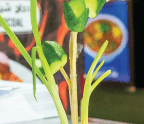
Yu Hua was born in 1960. He grew up in Haiyan County in the Zhejiang province of eastern China, at the height of the Cultural Revolution. His parents were both in the medical profession—his father a surgeon, his mother a nurse—and Yu would often sneak into the hospital where they worked, sometimes napping on the nearby morgue’s cool concrete slabs on hot summer days. As a young man, he worked as a dentist for several years and began writing short fiction that drew upon his early exposure to sickness and violence. His landmark stories of the eighties, including “On the Road at Eighteen,” established him, alongside Mo Yan, Su Tong, Ge Fei, Ma Yuan, and Can Xue, as one of the leading voices of China’s avant-garde literary movement.
In the nineties, Yu Hua turned to long-form fiction, publishing a string of realist novels that merged elements of his early absurdist style with expansive, emotionally fulsome storytelling. Cries in the Drizzle (1992, translation 2007), To Live (1993, 2003), and Chronicle of a Blood Merchant (1995, 2003) marked a new engagement with the upheavals of twentieth-century Chinese history. To Live—which narrates the nearly unimaginable personal loss and suffering of the Chinese Civil War, the Great Leap Forward, and the Cultural Revolution through the tragic figure of the wealthy scion turned peasant farmer Fugui—brought him his most significant audience to date, its success bolstered by Zhang Yimou’s awardwinning film adaptation.
Once an edgy experimentalist adored by college students, Yu Hua is now one of China’s best-selling writers. Each new novel has been an event: Brothers (2005–2006, 2009) is a sprawling black comedy satirizing the political chaos of the Cultural Revolution and the unbridled consumerism and greed of the economic reform era under Deng Xiaoping; the magic realist farce The Seventh Day (2013, 2015) is narrated by a man wandering the living world after his death; and his most recent, Wen cheng (The lost city, 2021), reaches back to the late days of the Qing dynasty. He is also one of the country’s best-known public intellectuals, having authored nonfiction books on topics including Western classical music, his creative process, and Chinese culture and politics. His New York Times column, which ran from 2013 to 2014, and China in Ten Words (2010, 2011) have been heralded as some of the most insightful writings on contemporary Chinese society.
More than a quarter century ago, I, then a college senior, reached out to Yu Hua to seek permission to translate To Live into English. Our initial correspondences were via fax machine, and I can still remember the excitement I felt when I received the message agreeing to let me work on his novel. We later exchanged letters, then emails; these days, we communicate almost exclusively on the ubiquitous Chinese “everything app,” WeChat.
Our first face-to-face meeting was in New York, around 1998. It was Yu Hua’s first trip to the city, and he responded to the neon lights in Times Square, attending his first Broadway show, and visiting a jazz club in the West Village with almost childlike excitement. He exuded a playfulness, a sharp wit, and an irreverent attitude that I found startling. Could this exuberant tourist really be the same person who wrote the harrowing To Live? Apparently so.
Our interviews for The Paris Review were conducted over Zoom earlier this year. I saw glimpses of the same quick humor, biting sarcasm, and disarming honesty I remembered from our time together twenty-five years before, but with new layers of wisdom and reflection.
—Michael Berry
INTERVIEWER
Tell me about being a dentist. How did that come about?
YU HUA
I’d finished high school in 1977, just after the end of the Cultural Revolution, when university entrance exams had been reinstated. I failed, twice, and the third year, there was English on the test, so I had no hope of passing. I gave up and went straight into pulling teeth. At the time, jobs were allocated by the state, and they had me take after my parents, who both worked in our county hospital. I did it for five years, treating mostly farmers.
INTERVIEWER
Did you like it?
YU
Oh, I truly disliked it. We had an eight-hour workday, and you could only take Sundays off. At training school, they had us memorize the veins, the muscles—but there was no reason to know any of that. You really don’t have to know much to pull teeth.

INTERVIEWER
When did you start writing short stories?
YU
In 1981 or 1982. I found myself envying people who worked for what we called the cultural center and spent all day loafing around on the streets. I would ask them, “How come you don’t have to go to work?” and they would say, “Being out here our work.” I thought, This must be the job


